Our Research and Reports
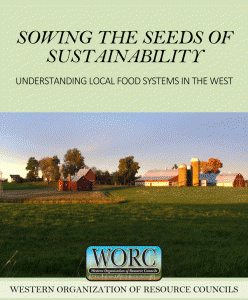
Sowing the Seeds of Sustainability
This paper examines the local food systems in seven states in which the Western Organization of Resource Councils (WORC) has member groups – Colorado, Idaho, Montana, North Dakota, Oregon, South Dakota and Wyoming. Using publicly-available data, we analyzed multiple aspects of food systems in order to understand where each state stood, in terms of the strength of both the production and demand side of the local food market.
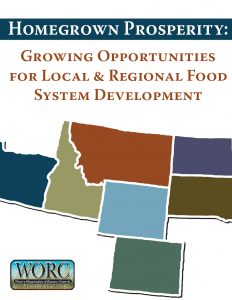
Homegrown Prosperity: Growing Opportunities for Local and Regional Food System Development
This report summarizes state legislation related to the development of local and regional food systems, either passed or defeated between 2005 and 2016 in WORC states: Colorado, South Dakota, North Dakota, Wyoming, Montana, Oregon and Idaho. This summary may not be comprehensive in all states as it does not include state appropriations bills in detail. State policy often changes quickly; this summary reflects research conducted in July 2016.
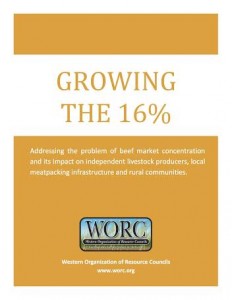
Growing the 16%
Growing the 16% addresses the problem of beef market concentration and its impact on independent livestock producers, local meatpacking infrastructure, and rural communities. Instead of trying to break up the four packers who bought 84% of the cattle raised by America’s ranchers, we turned our attention to the ranchers and small packers and processors who buy the rest of the cattle – the 16% of the market that isn’t controlled by major meatpackers -- to expand and enhance that market as a viable alternative for producers and consumers.
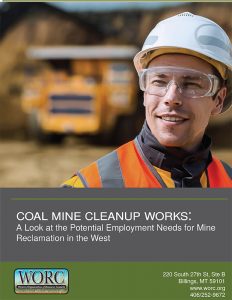
Coal Mine Cleanup Works
The collapse of the coal industry is devastating small communities across the Western United States, but reclaiming these mined lands quickly could create up to 6,081 full-time jobs per year in the critical two to three year period after mine closure according to our new report, Coal Mine Cleanup Works. The report estimates potential reclamation job creation for the Intermountain West (Colorado, Montana, New Mexico North Dakota, and Wyoming, as well as Hopi Tribe and Navajo Nation lands in Arizona and New Mexico) and provides recommendations for decision-makers to ensure cleanup is fully funded and employs the local workforce. These…
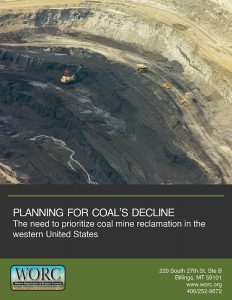
Planning for Coal’s Decline
More than a third of all land mined for coal in the Western United States awaits cleanup after a half-century of intensive strip-mining, but will a weakening coal industry be capable of cleaning it up? Planning for Coal’s Decline provides updated data on coal mine reclamation in the Western U.S. and recommends policies to help ensure coal mine cleanup before and after mine closure. Federal law requires coal companies to “contemporaneously” reclaim land mined for coal as mining progresses. As a precaution, the law also requires that mining companies provide funds or guarantees to pay for cleanup, usually through reclamation…
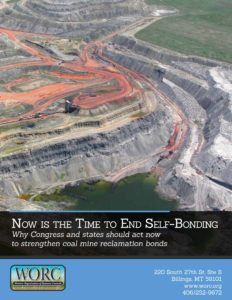
Now is the Time to End Self-Bonding
Now is the Time to End Self-Bonding makes the case for why Congress and states should act now to protect coal communities from picking up the bill for coal mine cleanup. A “self-bond” is a promise from a coal company to pay for legally required coal mine cleanup, known as reclamation, without providing any collateral. If a self-bonded coal company liquidates before completing reclamation, the self-bond becomes an uncollectible “I.O.U.” and the public is left without sufficient funds to complete reclamation. Several states continue to accept self-bonds for coal mines. There has never been a better opportunity to end self-bonding altogether…
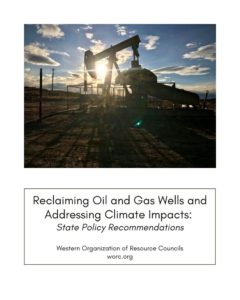
Reclaiming Oil and Gas Wells and Addressing Climate Impacts: State Policy Recommendations
Unplugged oil and gas wells pose a significant threat to our climate, as well as having negative impacts on water, air, and public health and safety. But the inventory of these wells, including orphaned wells, has been growing, not shrinking, year over year. The longer these wells sit, the more damage they cause. Reclaiming Oil and Gas Wells and Addressing Climate Impacts: State Policy Recommendations seeks to summarize the challenges state regulatory programs face and make recommendations for stronger policies that will help ensure that oil and gas sites are plugged and reclaimed in a complete and timely way. The…
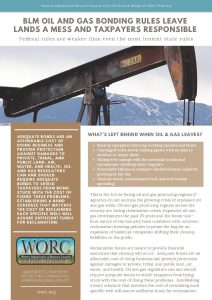
State and Federal Oil and Gas Bonding Policy Comparison
In the midst of historically low oil prices and plummeting demand, inadequate federal and state reclamation bonding requirements make it easier for deeply indebted oil and gas operators to declare bankruptcy and walk away from orphaned wells en masse. This report by the Western Organization of Resource Councils examines the bonding rules in eleven Western states and found that the federal Bureau of Land Management’s (BLM) rules are weaker than any state’s. BLM’s $25,000 minimum statewide bond, which covers unlimited federal wells in a single state, is four times lower than the typical state requirement. While the federal rules are…
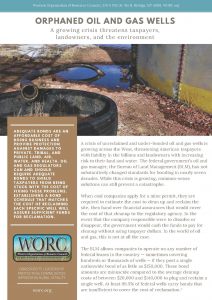
Oil and Gas Bonding: The Basics
A crisis of unreclaimed and under-bonded oil and gas wells is growing across the West, threatening American taxpayers with liability in the billions and landowners with increasing risk to their land and water. The federal government’s oil and gas manager, the Bureau of Land Management (BLM), has not substantively changed standards for bonding in nearly seven decades. While this crisis is growing, common-sense solutions can still prevent a catastrophe. When coal companies apply for a mine permit, they are required to estimate the cost to clean up and reclaim the site, then hand over financial assurances that would cover the…
